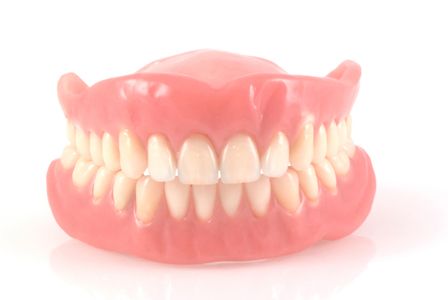For some of our patients, a bright, shining smile is nothing but a dream. Living with lost or damaged dentition can make people anxious about their smiles. Today, patients have the option of permanent or removable dentures, though choosing between the two isn’t as straightforward as it may first appear. By breaking down the advantages and drawbacks of both, you’ll be better able to decide which treatment will make you more confident in your smile!
No one should have to walk through life with a guarded grin. At the offices of Meredith Davis, DDS, we want all of our patients to enjoy all of the benefits a healthy smile can bring. If you’re in the Richardson, TX area and are interested in learning more about permanent or removable dentures, contact us today! Our team is ready to schedule a consultation and help give you a new oral outlook on life!
Denture Fundamentals
People have been dealing with excessive decay and losing teeth for millennia. While inserting pieces of bone, wood, or even animal teeth into sockets were some of the first methods of replacement, true dentures wouldn’t be seen until the Etruscan civilization in the 7th century BCE. These ingenious peoples would attach lost teeth from humans or animals to metal brackets that would slide easily into the mouth.
As time went on, dentures became much more common in the 1700’s thanks to an influx of sugar into the Western World. This promotes excessive decay, making dentures a much-needed alternative to empty-looking smiles. At the time, a variety of materials were used to create “false teeth,” including a resurgence in utilizing human dentition taken from the dead or purchased and pulled from willing donors.
Thankfully, the false teeth of today are constructed in much more wholesome and scientific ways. Even so, the reasons why people may need false teeth have remained the same. There are quite a few things that may lead patients to dentures in order to renew their smiles. Some of the most commonly treated conditions include tooth loss from:
- Excessive tooth decay
- Facial or jaw-related injury
- Periodontal disease
- A dental history lacking proper oral care
- The natural aging process
No matter why you suffer from missing teeth, removable or permanent dentures may be the life-changing treatment you’ve been looking for. During your consultation, our team will help you determine which type of dentures work best with your lifestyle.
A Removable Remedy
When most people think of dentures, it’s an image similar to wind-up false teeth that pops into their minds. While a full set of top and bottom dentures is useful, there are many other types that dentists employ to correct for missing dentition. Whether partial or complete, removable dentures require daily cleaning which can usually be accomplished in an overnight soak. Some of the most common types of removable false teeth include:
- Same-Day Dentures: These are sets of false teeth that some dentists keep on hand that let their patients leave the office with a temporary biting surface. Even so, a well-fitting set may not need to be replaced for a while.
- Partial Dentures: Sometimes only a small number of teeth need to be restored. In these cases, you may be fitted for partial dentures that are secured in place via brackets on healthy teeth.
- Complete Replacement: When all of the dentition needs to be reworked, complete sets of dentures are often the best option. This allows patients to have new upper and lower biting surfaces while only waiting for the dentures to be manufactured.
As time passes, your dentures will begin to wear down and become stained, just like natural teeth. Patients who take good care of their removable dentures may be able to keep them looking great for a long while. However, as a client ages, their dentures may become uncomfortable, requiring a fresh set to be re-fit accordingly. A well-constructed set of dentures are expected to last between seven to ten years.
Permanent Procedures
An alternative to removable dentures, permanent options create long-lasting replacements that need only standard oral hygiene to maintain their look and feel. This method removes the need to carefully clean dentures daily, letting you brush and floss as normal to remove built-up plaque and bacteria. These dentures are anchored in place using titanium implants, making them a perfect option for those looking for the look and feel of a natural smile.
It is important to note that “permanent” refers only to the implants themselves. Thanks to osseointegration, the titanium false roots allow the bone to grow over them, securing them into place. The dentures are fitted atop these implants, and it is these false teeth that may indeed be replaced as they become worn, stained or damaged over time (generally at the same rate as removable dentures).
These implant-supported dentures can be used to replace a small number of teeth using a bridge or an entire mouth full of dentition. Some types of “permanent” dentures even have the capability of being removed for easier cleaning or for those looking for a bit of relief. Titanium implant clasps are placed at strategic points around the jaw to provide strong support for false teeth, preventing them from slipping during speech oir at mealtime.
Dental Expectations
No matter which type of dentures you choose, you may need to undergo some procedures beforehand. An initial consultation lets your dentist take x-rays and make a close examination of your current dental condition. This helps to not only determine which style is best, but also design the look of your new false teeth.
By looking at your existing dentition and jaw bone density, your dentist will better understand what types of procedures you may need as the treatment progresses. Some patients need severely damaged or misshapen teeth to be extracted, while others might require grafting to combat poor bone density.
As a general rule, an excellent dentist will work hard to retain as much of your natural dentition as possible. This may make you a good candidate for partial replacements, which will include color-matching false teeth that give your mouth a more natural appearance. Post-procedure, you will generally be fitted with temporary dentures while you wait for your brand-new pearly whites to be constructed.
Denture Decisions
There are a number of benefits and drawbacks to both types of dentures. While permanent options seem to have a lot going for them, many patients still turn to removable dentures as their preferred treatment. Some of the factors that may help influence your decision include:
- Comfort: Removable dentures are known to be uncomfortable. Because they are designed to slip in and out easily, dental glues often don't hold them in place very well. Anchored dentures don’t have such an issue because the implants themselves are what secure false teeth in place.
- Surgery: Dental implants require surgical procedures to set them into your jawbone. Anchors generally require fewer operations when compared to a series of replacement crowns since only a few are needed to keep dentures in place. Even so, patients looking to avoid additional surgeries may want to keep removable treatments in mind.
- Bone Density: In order to securely mount implants into the jaw, there needs to be enough support material, which may require a bone graft before the treatment continues. Implants have the added advantage of promoting osseointegration, or bone growth around the titanium fixture, which actually makes your jaw stronger over time. Conversely, removable dentures have been shown to decrease jawbone density!
- Time: Some patients just don’t have the time available for permanent dentures. It may take months for some clients to recover from bone grafts, extractions, and the implantation procedure. People who don’t have it in their schedule for such time-intensive treatments may wish to look at removable options more closely.
- Cost: The price of dental care is often a prohibiting factor for many clients. Removable dentures are generally much less expensive, with clients spending around $300 for a full set. Patients may also adjust the look and feel of their new dentures with some additional cost. Conversely, dental implants are not often covered by insurance and may cost anywhere between $1,500 to $6,000 for a partial to complete cosmetic renewal. Many patients find the extra cost to be an adequate tradeoff for permanent dentures that feel just like their natural teeth.
When you arrive for your initial consultation, our team will assess your current situation and help determine which style of dentures works best for you. We even offer in-house financing plans and take a variety of credit solutions to help overcome any obstacle and help put a smile back on your face!
Don’t let anxiety about your oral health keep you from sharing your smile with the world. If you’re interested in learning more about denture solutions, call Meredith Davis, DDS right away! We’re waiting to help our patients in the Richardson, TX area to regain their confidence with a smile that will last a lifetime!


